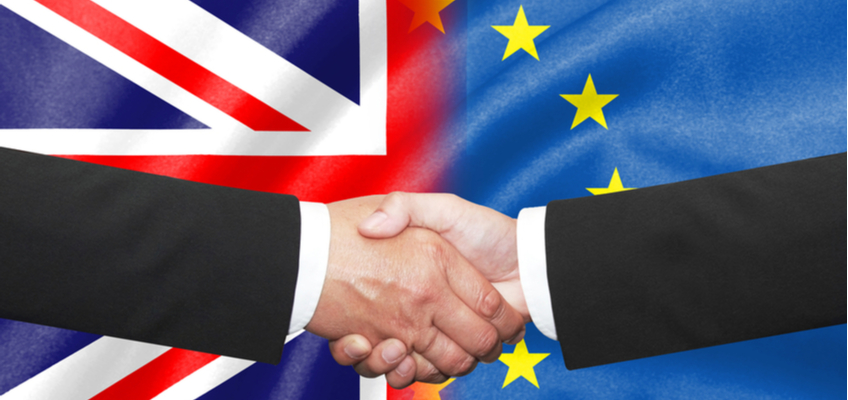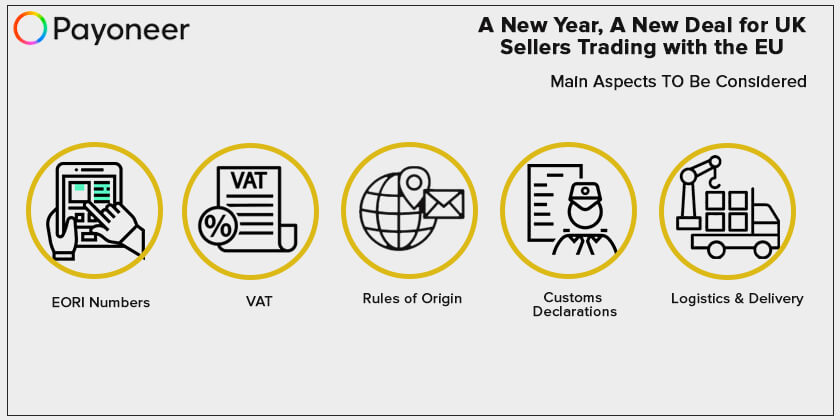
A New Year, A New Deal for UK Sellers Trading with the EU
After four painful years of back and forth, a Brexit deal has been reached and consumers on both sides of the English Channel can breathe a big sigh of relief. Relief in the knowledge that in the post-Brexit world, they won’t be slapped with increased food prices due to import tariffs from Europe.
The zero tariff, zero quota trade deal agreed on Christmas Eve by the UK and the EU is certainly a reason to be jolly, as the agreement, in general, promises to avoid imposing heavy import tariffs on food and goods being traded across the borders. As a result, there is far less potential for knock-on price increases to take hold.


But where does this leave UK sellers who were preparing so anxiously for a no-deal Brexit?
Well, online merchants will still need to prepare for new trading legislation, as the agreement will still entail many of the same preparations. To learn what these include, feel free to check out our Guide to Brexit.
For online and multi-channel sellers specifically, below are some of the main aspects you’ll need to consider and keep in mind.
EORI Numbers
Starting January 1st, those selling from the UK into Europe will need an EORI number to show they are an authorized and recognized seller. Those selling outside of the EU will already be familiar with this, as the EORI system has been in place for quite a while there already. The purpose of the EORI number is to help make the trading process across EU borders smoother and more efficient.
If you’re based in Northern Ireland and looking to sell to non-EU countries, you’ll need an additional EORI number.
VAT
While most goods exported to the EU from January 1st will have no VAT applied, there are some exceptions and it’s important to check if the goods you’re exporting are one of them.
However, sellers will have to pay import VAT once the goods arrive at their destination country. What’s more, each EU member state can decide for themselves what these rates are, so you’ll need to check the rate that’s applicable to your product line, depending on to where you’re exporting and when it needs to be paid (some VAT can be deferred to the importer’s quarterly return).
Rules of Origin
While the zero tariff, zero quote trade deal is a win for goods originating within the UK or EU, it’s a different story altogether for goods originating outside of these areas. In such cases tariffs will apply.
To know what is counted as ‘originating in the UK or EU’, you’ll need to be aware of how your products are assembled and are thus either ‘wholly obtained’ from the UK or EU, or ‘substantially transformed’ in the UK or EU to such an extent that a certain amount of value is added as a result. For full details on how the UK government understands such regulations, please read this guidance.
Customs Declarations
Under the new trade agreement, UK online sellers shipping goods to EU customers will not need to pay any additional tariffs for doing so. However, any seller shipping packages to the EU whose contents are worth up to £270 will need to fill in some additional paperwork, a CN22 customs declarations form. If you’re sending contents worth more than £270, you’ll need to fill in a slightly longer CN23 customs declaration form. If you’re selling from Northern Ireland, however, you’ll be pleased to know you’re relieved of such obligations and no customs declarations forms are required.
Logistics and Delivery
Sellers shipping wholesale goods to an EU retailer will need to follow a different process.
If you’re selling animal products, you’ll need to clear the EU’s Sanitary and Phytosanitary (SPS) Measures as detailed in paragraphs, 1, 2 and 3 of the UK government’s guide to importing and exporting goods.
Finally, as retailers and brands will need to fill in customs declarations forms for the first time in 40 years, the potential for delays is big. That’s why, in order to avoid the kind of scenes we saw over the Christmas period where thousands of lorry drivers were held up from passing over the English channel, investments and lobbying is currently in full swing to ensure logistics companies and personnel are kept up to date in real time so that supply chains can continue to flow efficiently.
For full details and guidance on the UK Government’s approach to exporting to the EU from the UK, please visit the UK Government website.




